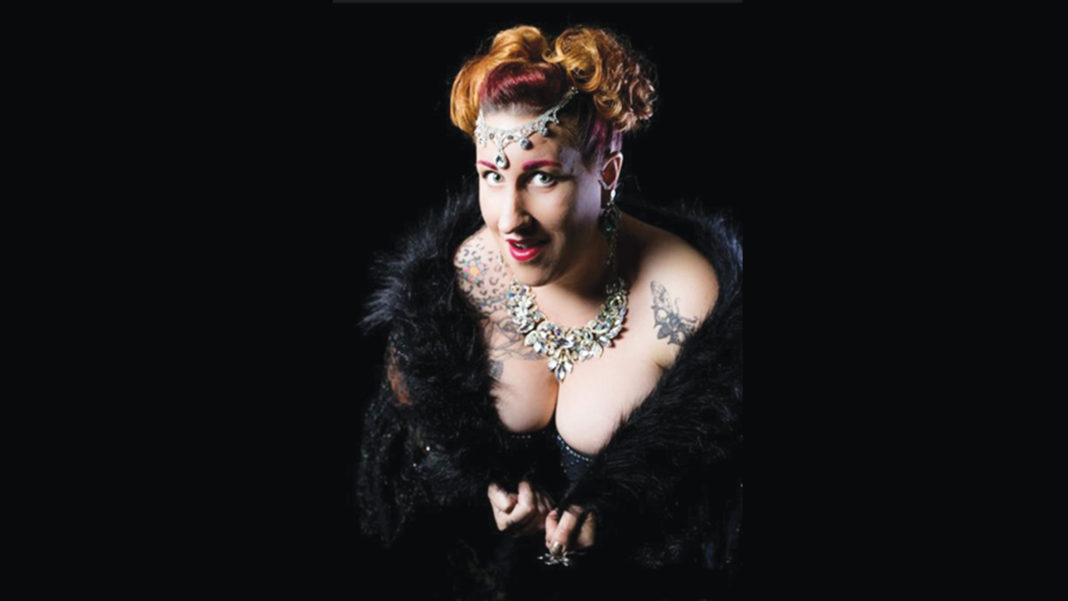The Smith-Rafael Film Center will host a screening and Q&A for the award-winning documentary Learning To Be Naked – Healing Through Burlesque. The title is fairly self-explanatory, but—as the film’s performers, often adorned in pasties, sparkles and tassels, reveal—there’s more to this story than meets the eye. For those willing to strip away a few metaphorical layers, what lies beneath is something powerful.
At its core, Learning To Be Naked presents the inspiring healing journeys of three individuals who share how burlesque transformed their lives. One featured performer is an amputee and breast cancer survivor who describes how burlesque helped her embrace her scars, her prosthesis and herself. Another woman recounts finding renewed power in the wake of a stroke that left her in a wheelchair. Rounding out the trio is a trailblazer of plus-size, Black and nonbinary burlesque who advocates fiercely for BIPOC and LGBTQIA+ artists to take the stage unapologetically.
For these performers, burlesque isn’t just a pastime—it’s a safe space for healing, a stage where they shed shame and emerge as the most fearless versions of themselves.
“I would describe burlesque as a performance art that is primarily performed by women and femme-presenting individuals, primarily done for women and for the queer community,” said director and producer Susan Wolf. “It’s an art form that’s very personal … and can be funny, satirical, edgy, classy—whatever you want. But that element of personal expression always comes through.”
Wolf conceived the project while working on a different film about Mata Hari, the World War I-era dancer and courtesan-turned-spy.
“I became absolutely fascinated by Mata Hari,” Wolf said. “She’s an interesting character and, in a way, she was an early burlesque dancer. She had a lot of lovers and just lived that independent, free lifestyle in a time when not a lot of women could do that.
“What interested me in modern burlesque was finding the common thread among the performers,” Wolf continued. “That thread became the focus of the film. We honed in on the transformational power of the art form—and the healing experience of burlesque. I admire the performers so much for getting up on the stage. It takes a lot of courage to be that vulnerable.”
Learning To Be Naked has already received several accolades, including best documentary at both the La Femme Film Festival and the California Women’s Film Festival. With another year of touring ahead, more awards may be in its future.
Still, Wolf acknowledges that burlesque remains a polarizing topic. For some, it’s an empowering art form. For others, it’s seen through the lens of titillation and the male gaze. But from Mata Hari to modern-day icons, women have long reclaimed their power—sometimes by literally getting naked.
“The desire to control women, their bodies and their sexuality is very old,” Wolf said.
From Eve in the Garden of Eden to Lady Godiva riding through town clothed only in her hair to the goddess Inanna descending through seven gates and relinquishing her power piece by piece, history is rich with women who reclaimed strength through shedding—not just their clothes, but societal constraints.
So what connects these mythic women with those in Learning To Be Naked? The core message: When a woman learns to be powerful and confident wearing nothing, she can be powerful and confident doing anything.
“The inspiration for the title came from Viola Panik, one of the performers who will actually be at the screening,” Wolf said. “She’s the one whose motto is ‘learn to be naked and then get dressed.’ And I think that encapsulates burlesque. It’s not about taking off your clothes—it’s about taking off the masks we wear and exposing yourself mentally, physically and emotionally.
“One thing about burlesque is that you have to have done the internal work to be able to get onstage and connect with the audience,” Wolf added. “You can feel when the performer is really present. I’ve also seen people get onstage who aren’t connected, and it’s clear—they’re not putting it all out there.”
That sense of presence isn’t just performance polish. It’s the product of deep personal evolution, and that authenticity, Wolf believes, is what gives burlesque its transformative power—for both performer and audience.
“I would hope the film helps people who are on their own journeys to find self-love and acceptance of themselves, complete with all their ‘flaws,’” Wolf said. “Especially in our current society, with its high standards and stereotypes, to love and accept oneself on a deep level is incredibly powerful. Every performer in this film has done that work—and you can see it onstage.”
The special screening and Q&A with the director and performers for ‘Learning To Be Naked – Healing Through Burlesque’ will take place at 1pm Saturday, June 15, at the Smith-Rafael Film Center, 1118 Fourth St., San Rafael. For tickets and details, visit learningtobenaked.com.






